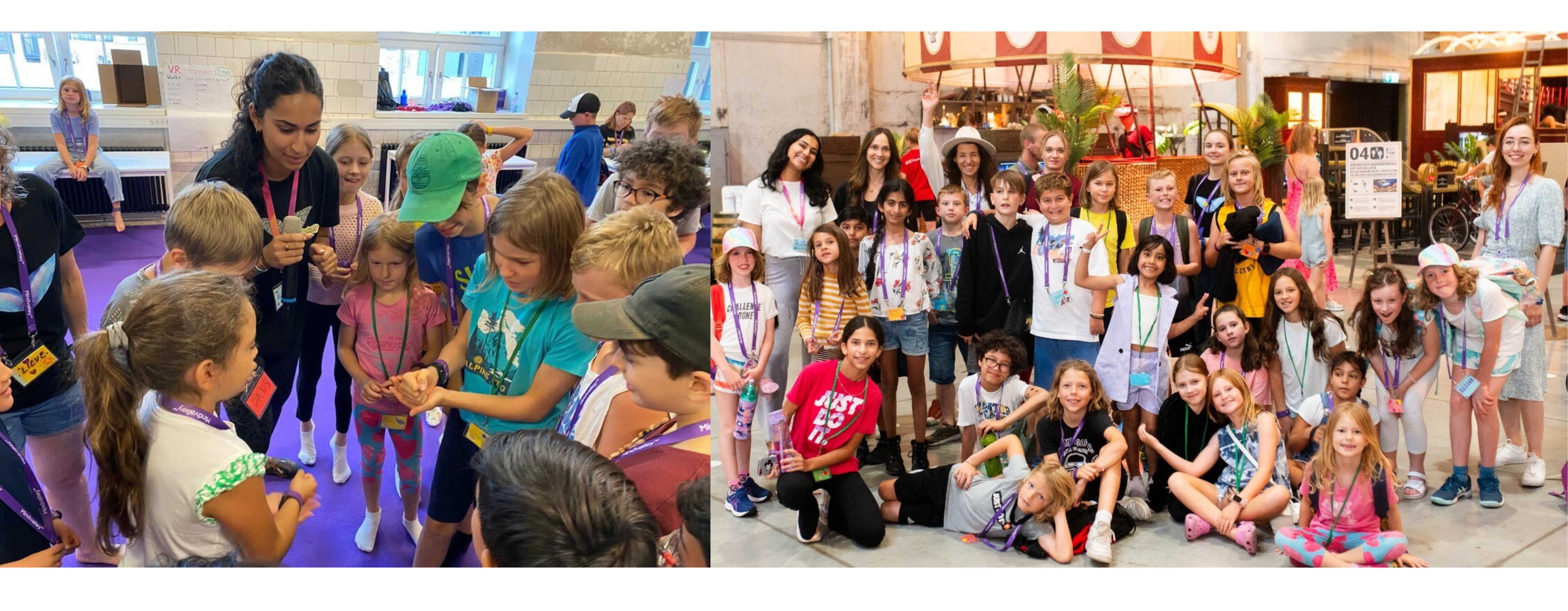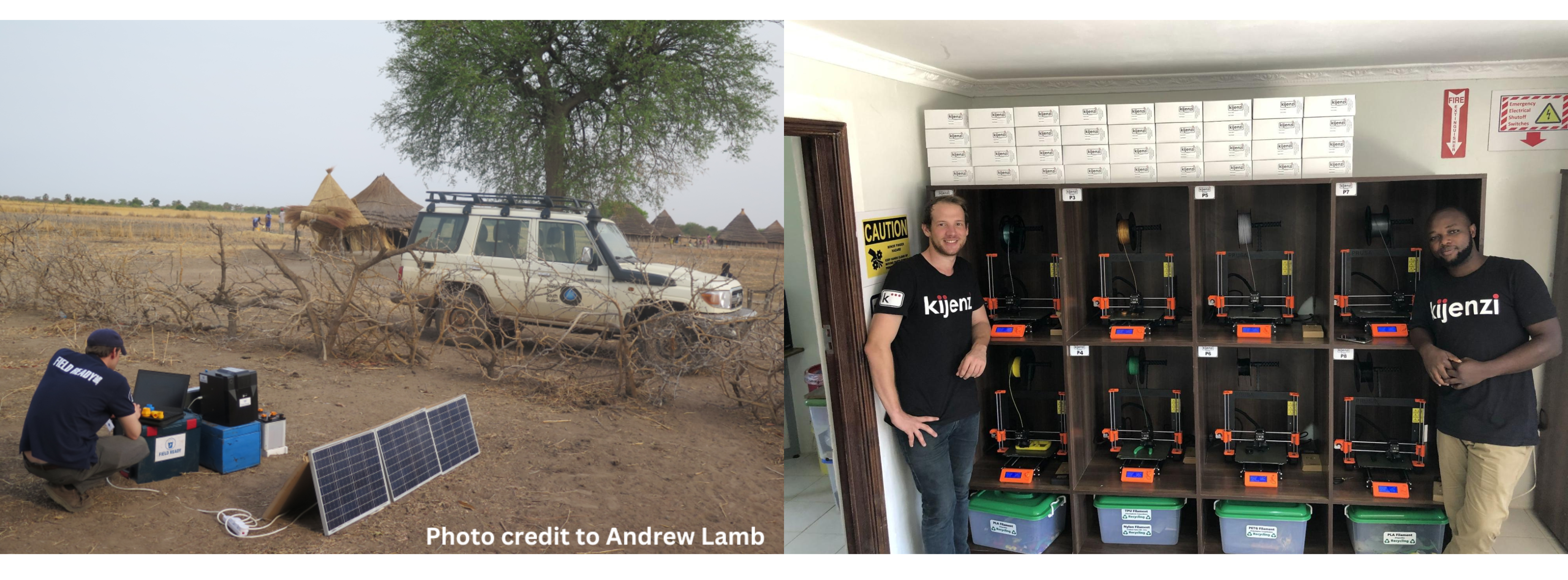GDI Profiles: Curious People and Human-Centered Approaches to Social Impact
Our GDI team brings together diverse backgrounds, experiences, and perspectives with different ways of thinking to create better outcomes within social impact. As a part of this series, we will share how folks on our team use their functional experience, ranging from consulting to engineering, medicine, psychology, and more, to support impact at GDI. We spoke with members across our global team about their experiences to learn more.
As the first installment of this series, we spoke with two members of our US-based Strategy and Build team, Alizah and Ben. Within their roles, Strategy and Build team members support the design and implementation of new initiatives GDI works on, identifying opportunities and paths forward for the organizations. Some of the initiatives Alizah has supported include the Home Based Child Care Initiative, Usha Lesizalo, and the African Technical Apprenticeship Network (ATAN). Ben is currently working on People on the Move, Public Mind, and Justice Rising initiatives. Alizah and Ben both work to shape their respective initiatives, and their different backgrounds come together to create human-centered approaches to shape social impact at GDI.
Alizah
Problem-solving and creativity are key ingredients in social impact, and they’ve supported my experience in consulting projects and developing learning programs for children.
In undergrad, I studied Health Sciences and Business, which provided me with a unique and complementary experience: I learned about the social determinants that drive health challenges for populations around the world while also developing a strategic toolkit on how to critically assess and solve problems in a data-driven, human-centered and financially-sustainable manner. I built on this skillset working at a private sector consulting firm, where I learned the importance of not shying away from multi-faceted problems and instead identifying what key information, resources, and processes are needed to solve a problem in a way that can be sustainable for all parties involved.
I consider my degrees and private sector experience my “traditional career path”. However, during that time I was also increasing my involvement in a separate passion of mine: developing and delivering experiential learning programs for kids aged 6-12 to prepare them for an evolving future. I work with Apollo as a part-time Program Director to create programs that focus on teaching kids about world problems, future technologies, and life skills, helping them to apply their knowledge to solve problems individually and collaboratively.
Developing and delivering learning programs for children involves considering their needs, interests, and developmental stages. As a Program Director at Apollo, I design programs with the end-user in mind, ensuring they are tested and refined based on children’s feedback, and are considered useful for creating long-lasting mindsets.
Our work at GDI focuses on improving life outcomes for vulnerable populations. My experience with Apollo has helped me approach social impact initiatives with empathy and design programs that are tailored to the specific needs and aspirations of the communities we aim to serve. This user-centered and participatory approach can lead to more inclusive and effective solutions, ensuring the most important voices are heard in the design and implementation of social impact programs. For example, in the Home Based Child Care (HBCC) initiative, GDI helps design and implement pilot programs in Kenya, India, and Rwanda to deliver outcomes that will impact children, women, GDP, and wider society. By gaining feedback in focus groups, interviews, and visits to parents, our team better understands lived experiences and uses our learnings to ensure a user-centered approach in pilot design and implementation.
Embracing the curious and creative mindsets of children helps me to infuse the social impact world with a spirit of innovation and open up possibilities for transformative change.
Additionally, working directly with kids gives me a front-row seat to their natural curiosity, creativity, and flexibility. These qualities often result in them questioning existing norms and assumptions – they have a knack for asking “why” and challenging the status quo. This is an inspiration in itself and serves as a reminder in my daily work to elevate these qualities in our approach to designing social impact initiatives. I can step into the shoes of an inquisitive and imaginative 8-year-old and ask myself – What are the out-of-the-box, unconventional solutions that we can explore to address social challenges? What is the status quo (e.g., entrenched beliefs, biases, and systems) and how can it be challenged to address the root causes of social problems? Embracing the curious and creative mindsets of children helps me to infuse the social impact world with a spirit of innovation and open up possibilities for transformative change.
Ben
I was struck by how many of the tech companies trying to hire us were focused on developing solutions to incrementally improve the standard of living of the wealthiest of people but largely ignored everyone else.

I left college with a mechanical engineering degree, but no desire to enter the industries that most of my classmates were in. I was mostly struck by how many of the tech companies trying to hire us were focused on developing solutions to incrementally improve the standard of living of the wealthiest 10-20% of people but largely ignored everyone else.
In the years following, I was driven by a desire to see the field that I had naturally fit into (engineering) better leverage itself in support of social impact. For much of the last 12 years, I have bounced back and forth between working within development/humanitarian initiatives and going back to engineering school (MS in environmental engineering and Ph.D. in mechanical engineering), trying to bridge the spaces between tech innovation and social impact wherever I could. In more recent years, after co-founding my company Kijenzi, I became more and more interested in how to apply some of the skills that I had picked up along the way in support of broader business models and strategy development rather than having just a strictly technology focus.
I’d like to think that my eclectic mix of experiences has made me adaptable and creative, being comfortable with the ambiguity that comes along with the launch of new projects and initiatives, and adding structure where there is none. While I don’t use much from my thermodynamics or kinematics classes day to day, I think the years of engineering education provided me with a strong set of analytical skills, critical thinking, and general practicality. My Ph.D. work primarily focused on human-centered approaches to technology design and implementation, yet these perspectives are highly relevant for driving social impact more broadly.
When applying human-centered design in engineering, it revolves around understanding the mindset of the end-users who will utilize the widget or app you are creating. The engineer must not only ensure that the technology solves the user’s problem but also seamlessly integrates into their daily lives. It also means being very aware of all possible scenarios, as users may employ your product in unexpected ways or diverse environments you hadn’t foreseen.
At GDI, we coach initiative leaders to keep their target beneficiaries at the core of their business model, consider all possible outcomes, and collaborate with them in testing, prototyping, and incorporating feedback into their strategies. While some of our initiatives do have some technology-element (such as Public Mind’s AI-driven tools), most of our initiatives call for very different forms of innovation. For instance, my current collaboration with Justice Rising aims to develop pedagogy and school management frameworks for improving education outcomes in conflict zones.
Though these frameworks we are building do not introduce entirely new products or practices, we have seen that most of the existing solutions on the market overlook the realities experienced by educators in conflict zones (i.e., they were not adequately designed with the user or their goals in mind). Thus, while this incubation does not require any level of technology development (at least in the traditional sense of the word), my skills and experiences with human-centered design, honed in an engineering context, still regularly come into play during GDI incubation as we define a more user-friendly solution.

